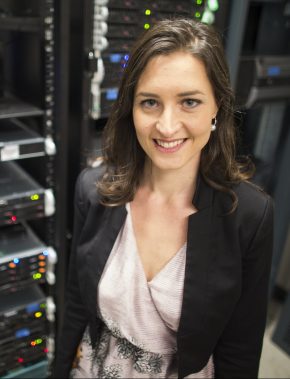
Assistant professor of bioengineering Giulia Palermo at the Marlan and Rosemary Bourns College of Engineering (BCOE) at the University of California Riverside (UCR) has been awarded a $650,000 National Science Foundation (NSF) CAREER Award to investigate the molecular mechanisms of newly emerging CRISPR-Cas gene editing technology. NSF CAREER awards are awarded to assistant professors to fund research that is expected to form a firm foundation for a lifetime of leadership in integrating education and research.

As you may recall learning in early biology classes, all organisms are made of two types of biomolecules: larger, typically double-stranded deoxyribonucleic acid (DNA) and smaller, typically single-stranded ribonucleic acid (RNA). These biomolecules contain the instructions for any living thing to develop, survive and reproduce.
With the CRISPR technology, scientists can precisely manipulate this DNA and RNA – essentially “tricking” a cell’s natural repair mechanism into following a new set of instructions. With this new NSF funding, Palermo will use computer simulations to understand the mechanism of action of emerging CRISPR systems, how they target RNA and DNA, to finally cut the DNA double-helix.
The Palermo lab will use state-of-the-art supercomputers to characterize the way how gene editing works. This is an exciting opportunity for computational research, which will support experimental science in refining methods for gene editing with CRISPR-Cas, expected to open new possibilities for nucleic acid detection and bioimaging. Additionally, findings can be applied beyond the biosciences to the energy and agricultural industries to create a more sustainable world, from producing fuel more efficiently to developing drought-resistant crops.
Ultimately, Palermo’s findings are expected to help bridge the gap between processes on the molecular level and real-world engineering solutions.
Local students interested in gene editing will also benefit from the research project, which includes an educational outreach component. Pre-college and undergraduate students, with a focus on women and those from underrepresented groups, will gain mentorship opportunities and hands-on experience in program coding and computation, building the technical skills to succeed in the 21st century workplace.
To learn more about Palermo’s latest research, visit the Palermo Lab website.